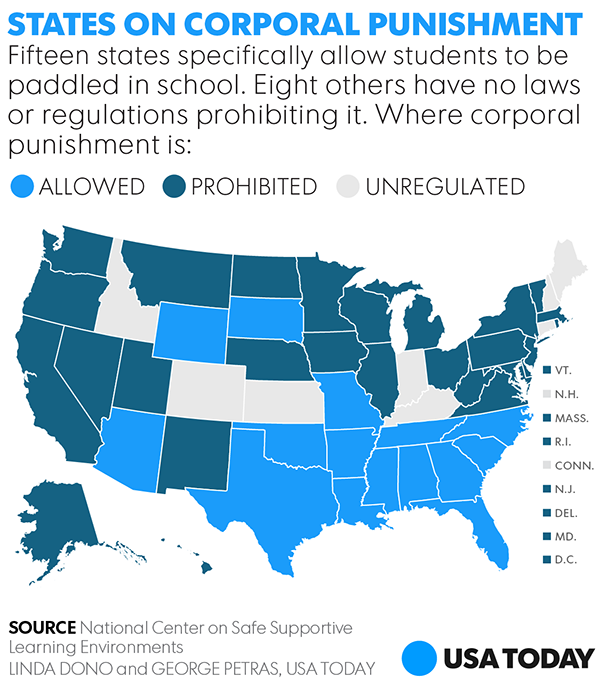Paddling to be allowed at Three Rivers ISD
 Beatriz Alvarado
Beatriz AlvaradoThree Rivers ISD administrators are going shopping for a paddle.
As part of a new policy approved by the board Tuesday, the paddle, likely to be wood, will be used to administer corporal punishment when a student misbehaves at school.
Corporal punishment is defined as the deliberate infliction of physical pain by hitting, paddling, spanking, slapping, or any other physical force used as a means of discipline.

Three Rivers Independent School District trustees voted 6-0 on the motion, with one trustee absent. The policy states only a campus’ behavior coordinator or principal can administer the disciplinary measure at their discretion. Three Rivers ISD students, whose parents have provided written and verbal consent, will receive one paddling for his or her infraction when they misbehave at school.
Parents will be able to decide, upon registering their children for the upcoming school year, whether they want to opt in or out.
“If the parent is not comfortable with it, that’s the end of the discussion,” Three Rivers ISD Superintendent Mary Springs said.
Texas is among 15 states that specifically allow schools' use of corporal punishment; eight other states have no laws or regulations against it, according to the National Center on Safe Supportive Learning Environments, part of the U.S. Department of Education.

In November 2016, then Department of Education secretary John B. King Jr. sent a letter to state leaders urging them to end the use of corporal punishment in schools, citing the practice is linked to harmful short-term and long-term outcomes for students.
More:U.S. Education Secretary to schools: Stop hitting, paddling students
In the short term, students who are administered physical punishment for their actions at school show an increase in aggressive and defiant behavior, according to King's letter. In the long term, students who are administered corporal punishment in school are more likely to later grapple with substance abuse and mental health issues, including depression, personality disorders and post-traumatic stress, according to the letter.
More:King Sends Letter to States Calling for an End to Corporal Punishment in Schools
Three Rivers Elementary School’s campus behavior coordinator, Andrew Amaro, pitched the idea to district leaders earlier this year. Amaro, a Three Rivers native, said he hopes the new disciplinary measure will have a more immediate effect on students than do ISS (In School Suspension) or detention.
Prior to Tuesday, the district had a policy prohibiting the use of corporal punishment. It’s unclear what year the board adopted that policy, but Amaro recalls being disciplined with a paddle during his time as a Three Rivers ISD student.
“I believe it worked,” Amaro said. “It was an immediate response for me. I knew that if I got in trouble with a teacher and I was disrespectful, whatever the infraction was, I knew I was going to get a swat by the principal.”
Amaro said students will be paddled for minor infractions, such as being disobedient to teachers or not following rules in the classroom.
The Education Service Center for Region 2 oversees 41 independent school districts in South Texas. Of those, 13 had local policies in place in 2015 that prohibited the use of corporal punishment: Alice, Benavides, Corpus Christi, Driscoll, Flour Bluff, Kingsville, London, Port Aransas, Ricardo, San Diego, Santa Gertrudis, Sinton and Skidmore-Tynan.
As of 2015, 27 independent school districts in Region 2 had policies in place allowing corporal punishment to be used as a form of discipline: Agua Dulce, Aransas County, Aransas Pass, Banquete, Beeville, Ben Bolt-Palito Blanco, Bishop, Brooks County, Callalen, Freer, George West, Gregory-Portland, Igleside, Kenedy, La Gloria, Mathis, McMullen, Odem-Edroy, Orange Grove, Pawnee, Pettus, Premont, Riviera, Robstown, Taft, Tuloso-Midway, Three Rivers and West Oso.
All districts that allow corporal punishment require parental consent for such disciplinary measures to take place.
School districts in Texas are not required to report corporal punishment incidents to the Texas Education Agency, said TEA spokeswoman DeEtta Culbertson.
Springs said tracking the incidents will be crucial to evaluating the new policy's effectiveness in deterring students from misbehaving consistently.
"We will look at how many discipline referrals were made compared to last year and how many times (corporal punishment) was administered," Springs said. "If it reduces the number of discipline referrals, then that is a good thing."
Beatriz Alvarado (@CallerBetty) | Twitter